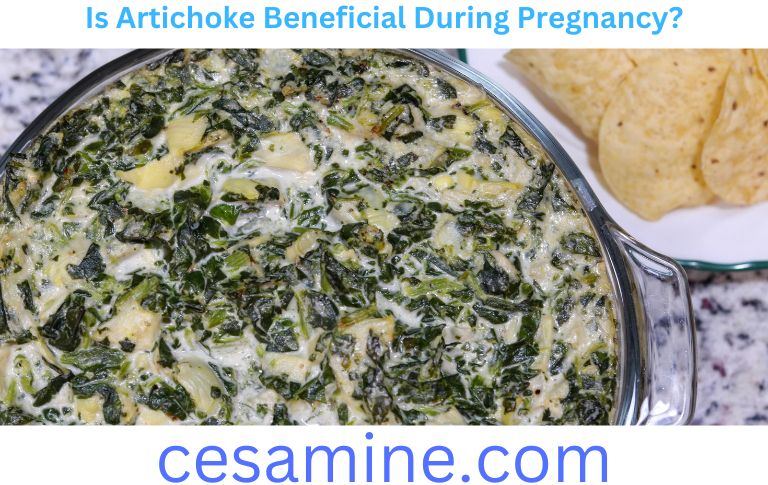The mother and the foetus both benefit from proper nutrition throughout pregnancy. The mother must carefully choose her nutrients since she is the baby’s primary source of nutrition.
With the nutrients it provides, the artichoke prevents preterm delivery and also protects the infant from anaemia. It is a crucial component in the growth of brain cells. Additionally, it helps the mother’s intestinal issues be avoided.
A lady might have a more pleasant pregnancy because to artichokes. However, as always, excessive artichoke eating is not advised.
Nutrition should be given a distinct emphasis throughout pregnancy. The artichoke, on the other hand, is a vegetable that is underutilised while being a beneficial food.
Expectant moms look at things like how much artichoke should be ingested during pregnancy and if it should be consumed.
This simple-to-cook vegetable’s low calorie, low fat, low sugar, and high fibre contents all contribute to the baby’s healthy growth throughout pregnancy.

Artichokes During Grand motherhood
Fiber content is high:
The expecting mother’s excessive, abnormal bowel motions increase throughout pregnancy. Constipation and motion sickness are other common issues. Fibrous meals are consumed at this time to assist lessen these issues.
The strain on the internal organs increases as the baby starts to develop. Artichokes may help lower blood pressure because they help control bowel motions during pregnancy.
Per artichoke, there are 10 grammes of fibre. The woman’s digestive issues won’t exist thanks to this ratio.
The source of magnesium: Magnesium has a significant role in tissue formation.
The demand for magnesium in the woman’s body increases if she is pregnant. If not enough magnesium is consumed, issues including leg cramps, bodily fluid retention, and edoema are more likely to occur.
Artichokes may help you get the 50 milligrammes of magnesium per day that you need.
Choline May Be Found In Artichokes:
The mother’s choline needs are satisfied by eating artichokes when she is pregnant. An organic acid called choline has a significant impact on how the baby’s brain develops. A woman may need as much as 450 mg of choline per day when she is pregnant.
There are 41 mg of choline in a single artichoke. When choline is consumed in sufficient amounts, a baby’s memory functions better and neural tube abnormalities and other mental problems are less likely to develop.
From the perspective of the mother, it also lowers the risk of breast cancer since it lowers the body’s homocysteine content. In addition, conditions including cancer, heart disease, and unconsciousness might develop if the blood homocysteine level is excessive.
Folic acid’s source is:
Pregnant women must consume artichokes to get the folic acid they require. Folic acid is a substance that promotes a baby’s growth, development, and cell division. Approximately 107 mcg of folic acid are included in one artichoke.
It not only guarantees the baby’s healthy growth but also avoids the issues of neural tube defects and a disconnected spine. Additionally, it shields the infant against brain and head malformations.
Premature delivery and low discomfort in the newborn are both risks associated with folic acid deficiency during pregnancy.
Low in fat and cholesterol: It’s critical that pregnant mothers eat low-calorie meals to help prevent pregnancy and delivery difficulties.
You should be careful not to take more cholesterol than 300 mg every day. Experts advise eating artichokes while pregnant since they are healthy and low in cholesterol and fat.
It contains benefits that guarantee the mother’s and the child’s health as well as the mother’s defence against heart and circulation conditions. Foods containing iron and vitamin C include artichokes.
One artichoke has 8.9 milligrammes of vitamin C. It is beneficial for the immune system development of the infant.
Additionally beneficial for the anaemia issue, the iron content lowers the chance of preterm delivery.
In addition to these, artichokes also have vitamins B2 and A.
As you can see, artichokes are a vegetable you have to eat constantly.
Apart from these, eating artichokes while pregnant offers other advantages.
An artichoke has around 1.33 mg of niacin. This promotes the proper development of the baby’s skin and digestive system.
Do Side Effects Occur During Pregnancy?
The artichoke alone is a beneficial vegetable. It is impossible to overstate the advantages of artichokes in preventing digestive issues including nausea and diarrhoea, enhancing liver function, and preserving cholesterol balance.
However, eating artichokes while pregnant may have certain negative consequences. They include Dec;
Effects of allergies: Allergic reactions may include symptoms such skin rashes, itching, difficulty swallowing, urticaria, wheezing, and swelling of the tongue.
Such allergic reactions may result from excess artichoke leaves. Because of this, pregnant women should be cautious about eating artichokes.
Effect of a diuretic: Artichokes have been used as a diuretic for centuries. Because of this, eating too many artichokes while pregnant might make you urinate a lot.
Gallbladder and liver effects: Regular eating of artichokes during pregnancy improves digestion and aids in the liver’s removal of waste. However, artichokes may be problematic since they induce women with liver illness to secrete more bile.
In this situation, limiting artichoke intake is advised. Gallbladder contractions have sometimes been linked to the usage of artichoke leaves. More discomfort may result from it, particularly in gallstone-afflicted females.
In this situation, it is advised to take artichokes in moderation after seeing a physician.
- Can You Eat Raw Broccoli? The Response Will Shock You
- Celery Juice Health Benefits and Side Effects
- Chestnuts: The Nutritional Powerhouse of Autumn and Winter: A Cultural and Dietary Perspective
- Corticobasal Degeneration: Warning Signs Of The Degenerative Disease
- Diabetes Diet: Expert Suggests Healthy Snacks Alternatives To Manage Blood Sugar Level